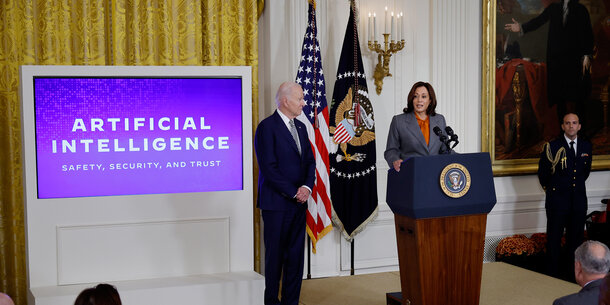In 2018, the Supreme Court decided Carpenter v. United States, a landmark case that requires the government to obtain a warrant before compelling a cellular service provider to hand over detailed location information about its customers. Since Carpenter was decided, law enforcement and intelligence agencies have made an end run around this warrant requirement by purchasing detailed and intimate information about Americans from commercial data brokers. New bipartisan legislation introduced in Congress by Reps. Warren Davidson (R-OH) and Sara Jacobs (D-CA) would put an end to this practice, strengthening privacy protections for Americans.
Fourth Amendment Protections
The Fourth Amendment prohibits government officials from performing “unreasonable searches and seizures.” Courts interpreting this requirement have ruled that the government must obtain a warrant before seizing or searching information in which a person has a reasonable expectation of privacy. However, courts have also said that there is generally no reasonable expectation of privacy when a person voluntarily shares information with others. For example, the government cannot intercept your private phone calls without first obtaining a warrant. But because you share the phone numbers you dial with your phone company (which needs the numbers to complete your calls), you have no reasonable expectation of privacy in those numbers, and the government can obtain them from the phone company without a warrant — even though the content of those calls is protected. This is known as the third-party doctrine.
Carpenter examined the government’s warrantless acquisition of a week’s worth of location information from a robbery suspect’s cell service provider. Narrowing the third-party doctrine, the Supreme Court ruled that the government violated the Fourth Amendment by not obtaining a warrant, because the location information provided a comprehensive picture of the suspect’s life and because he had no choice but to share that information with his cell phone company (as cell phones are a necessity in modern life). Under Carpenter, the government must get a warrant before accessing information about a person — even when the person shares that information with a third party — if the information is sufficiently sensitive and sharing it is effectively mandatory.
Closing the Data Broker Loophole
Since Carpenter was decided, federal law enforcement and intelligence agencies have increasingly purchased Americans’ information from commercial data brokers. While this practice violates Carpenter’s spirit, if not its letter, agency lawyers have argued that a warrant is required only when the government compels a third party to produce information — not when the third party is paid to produce it. Using this flimsy justification, government agencies have purchased a broad swath of incredibly sensitive information such as email metadata (for instance, the time, source, and destination of emails) and browsing history. Indeed, several law enforcement and intelligence agencies, including the FBI, the Department of Homeland Security, and the Department of Defense, have purchased cell phone location information — the same data that was at issue in Carpenter.
The Davidson-Jacobs bill, which was introduced last week as an amendment to the National Defense Authorization Act, would put a stop to these privacy invasions. The bill prohibits federal law enforcement and intelligence agencies from purchasing Americans’ location information, web browsing history, internet search history, or any other information protected by the Fourth Amendment, and requires these agencies to get a court order before obtaining this data. Other agencies may purchase this information in anonymized form, provided the data cannot reasonably be re-identified and they do not share it with federal, state, or local law enforcement and intelligence agencies.
The amendment strikes a reasonable balance between the government’s legitimate need to acquire information and Americans’ privacy interests. The protected information could reveal intimate details about a person’s life, such as their political beliefs, whether they have substance abuse problems, and whether they have sought reproductive health care. The government should not be able to access such sensitive information without a warrant.
Comprehensive Surveillance Reforms Needed
As the government’s attempts to undercut Carpenter’s clear command demonstrate, surveillance reform must be comprehensive if it is to be effective. Purchases from data brokers are just one of the many ways the government surveils Americans without a warrant. Another such tool is Section 702 of the Foreign Intelligence Surveillance Act, which allows the government to conduct warrantless surveillance of non-Americans overseas. This surveillance inevitably sweeps in Americans’ private communications, which the FBI and other government agencies then deliberately access by running queries of the data targeted at Americans. Last year, the FBI performed 200,000 of these “backdoor searches” — more than 500 warrantless searches for Americans’ communications every day. Section 702 will expire at the end of this year unless reauthorized, and lawmakers on both sides of the aisle have said that they will not vote to reenact the law without “significant reforms.”
The Brennan Center is part of a cross-partisan coalition of civil liberties and privacy groups that have proposed wide-ranging surveillance reforms to prohibit warrantless backdoor searches, close the data broker loophole, and otherwise ensure greater protections for Americans’ privacy rights. Sweeping changes are necessary to ensure that the government cannot replace one warrantless spying tool with another, as it did after the Carpenter decision.
Even as a standalone measure, though, the Davidson-Jacobs amendment would significantly advance Americans’ privacy rights if enacted. Other members should join Reps. Kelly Armstrong, Ben Cline, Veronica Escobar, Pramila Jayapal, Zoe Lofgren, and Nancy Mace in co-sponsoring it and should work with their colleagues to ensure its rapid passage. This is an opportunity to close a Fourth Amendment loophole that allows the government to pry into the most intimate details of people’s lives without a warrant. Congress should take it.






